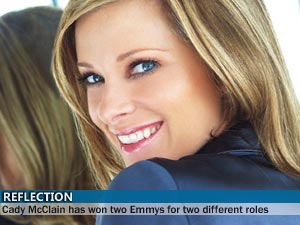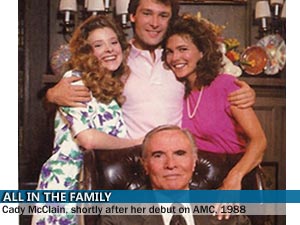

From a viewer's standpoint you seem to have more fun playing Rosanna.
I cry a lot less. Crying sucks on a daily basis. It's depressing. It makes me laugh when I read a good bitchy line. I kind of miss being bitchier. When I first started playing it, it was hard. Literally, I shook. I thought, "Oh my God, how am I going to be a bitch to Maura West? She's so good and she's so tough and she's so confident in her shoes and I'm the newbie and I've got to be a bitch to her." I kept wanting to say, "I'm sorry" afterwards. But she was so nice. She was like, "No, let me have it!" Now, I don't know whether this is good news or bad news, but being bitchy comes really easy to me. I can really be... I've gained maybe too much confidence in that regard.
Has it bled over to the real world?
It may have! That's what they say about actors. You start playing a part and it can bleed over. So far, I haven't done too much damage in my own life!
Your time on As the World Turns is coming to an end again. Do you ever worry that being honest with your fans will result in some sort of backlash against you?
Not backlash. I know that throughout the history of daytime press, it's always been really important to be positive about the shows that you're on, to support the show and the network. And I've always been a big trouper in that regards -- 20 years. The fact that in 2006 I spoke out about something, it meant that it had to be a really big deal. And I think that now, three years later, we're all beginning to recognize it is not necessary to have torture be a part of entertainment. It is not an issue that we should trifle with in our morality tales. If, for example, you're going to go down that route then there have to be consequences for your behavior. You can't just be forgiven overnight because you had a good intention behind your torture. I think as a country, we're wrestling with that. I've been accused of making entertainment a political issue. We're making shows for other people to watch. If we only think of that in a tiny little box that we're not affecting those viewers with our ideas and our ideals, especially when this show is actually viewed in the Middle East and we are considered a real American creation -- the soap operas -- then it's being very short-sighted about the effect that we are having on other people. So I'm not sorry for speaking out about that. I'm not sorry about being honest about any of the things I've said since then.
 It's not that I don't support daytime. Sometimes I just get frustrated when there are opportunities and people just don't want to hear it. People don't want to hear the truth. And the person who speaks what I see as my truth, certainly, often takes a hit for it. Especially in our culture I think it's very important to start speaking out about what you believe and to stop turning away. If someone gets hit on the street, most people turn away. One out of ten people will say something. And I think that's screwed up. Like, "Oh, it's none of my business." It's somebody getting hit! What are you going to do about it? I also think that daytime is the perfect place to address that sort of thing -- our American personality and what is flawed in it.
It's not that I don't support daytime. Sometimes I just get frustrated when there are opportunities and people just don't want to hear it. People don't want to hear the truth. And the person who speaks what I see as my truth, certainly, often takes a hit for it. Especially in our culture I think it's very important to start speaking out about what you believe and to stop turning away. If someone gets hit on the street, most people turn away. One out of ten people will say something. And I think that's screwed up. Like, "Oh, it's none of my business." It's somebody getting hit! What are you going to do about it? I also think that daytime is the perfect place to address that sort of thing -- our American personality and what is flawed in it.
Do you think people want to be told what's flawed?
I don't think it's telling them. I think it's including them in the conversation. It's having a conversation about it. Because everybody knows racism is wrong. Everybody knows sexism is wrong. Everybody knows bigotry is wrong. It's... when Cindy [Parker, a character on All My Children] had AIDS and people wanted to turn away and not deal with it. Now you have a character that you love who's doing something wrong and struggling with it. "I want to be there for this person, but I'm afraid." To me that's what [AMC and One Life to Live creator] Agnes Nixon was all about. It was political. It was absolutely a political conversation with the audience about this issue. There's a couple of companies around the world, one's called PCI-Media Impact, and they sponsored an event that Chris Goutman invited me to go to with him in St. Lucia. They had this workshop with actors down there because they wanted to make a radio soap opera to deal with the issues on their island. They're doing the core of what soap operas are and can be the most effective at, and yet we're not doing it. We're falling into the what's hot, what's the latest, what's new, how can we communicate with the young people? I've seen enough and been around enough to know what is compelling. I think it's compelling to have storytelling that is issue-based.
I think that someone just has to convince the networks that it's not too dangerous or too risky. The networks shouldn't say, "Oh, we're going to put it in the realm of a love story." No, we're gonna talk about this situation -- whatever it might be -- and deal with it. We just need someone who can convince the networks to allow them to do it again. That's what Agnes somehow had the ability to do, and I don't know if anybody since her has really been able to push it through. I think World Turns has done a fair amount, but because it's a [Procter & Gamble-produced] show, it tries to be very careful around those issues. That's the position that P&G takes and I totally respect that, but I think we all have to try a little harder if we want this medium to go on.
If the networks did go back and worried more about the storytelling and less about what's hip, do you think that would bring about a resurgence in the soaps?
I think that young people are much smarter than anybody gives them credit for. And they know when they are being targeted and they don't like it. It's like being condescended to. When I was young, I wanted to watch what the older people were doing because they looked like they were having a lot more fun and they were a lot more free. So-and-so was schtooping so-and-so on the desk and... Ooh, that was so glamorous. I could see teenagers at my high school any day. And if there are going to be teenagers on the show, they should be involved in something exciting as opposed to just being there to reflect real life. I don't think that soaps reflect real life very well. I think the purpose of them is to be larger than life. It is the melodrama. So-and-so needs to get kidnapped and so-and-so needs to run after them... it's the entertainment quotient.
I think there are a lot of other issues that can be dealt with in an interesting and unique way, and people would tune in for that. The Luke and Noah story is freaking huge. And now they have a gay story one One Life to Live. It's about time. I still wonder, though, where are all the Black people? There are no Chinese people. There are no Jews. Whye aren't they represented? Not everybody's a Protestant -- not that there's anything wrong with it. The United States is made up of a lot of other kinds of people. Again, I think it's condescending to have your token Asian person or token African-American person. Families interacting, dealing with each other. The melting pot. Everybody has the same dream. White trash and the rich. Culture clashes. That's the stuff that makes up daytime TV and the stuff daytime can do better than primetime.
 So what's next for you?
So what's next for you?
Well, I am probably never going to be asked to work on another daytime show after this interview, which is partially why you're getting it all. (laughs) I've turned 40 and I have been paying attention for the past 20 years. I do care. I do watch the shows. I'm not sitting home with a VCR watching every show, every day, but when things happen, I know the work that goes into it, the effort, and what's behind a decision. I've always wanted to know because I've always felt like there are people paying attention. If you make something and put it out into the world, there are at least 4 million people watching daytime TV. That's a lot of people. Look at this group of people that are all making this effort into making this show. It has a value, it has a worth. If you think highly of your audience then you know that they deserve the best. You really need to dig down and think about it. When you start placating to your audience and thinking somebody is just making toast while they watch this, then you're just going to give them Swiss cheese. I think people are smarter than that and respond to being given worthwhile stories.
If you're right and Cady McClain is never hired again, what do you take away from daytime?
(laughs) I always like to say daytime's been veddy, veddy good to me. It was a lot of hard work. It's almost like physical labor, like running a marathon. I learned a lot about patience (laughs). I've learned that it takes real courage -- especially for male actors -- to put their feelings out there. It's the emotions that are your paint box. It's not easy and not for the faint of heart. And I am just grateful to have had the good times.